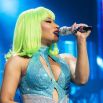English singer, songwriter James Bay is quickly becoming a household name. The singer and deftly skilled guitarist released his debut album this Chaos and the Calm in March, which netted two worldwide smash single "Let It Go" and "Hold Back The River." Though his sound is draws on older influences, notably American artists from the 1960s, 70s and 1980s, there is something inherently modern to his story. Bay got his start playing open mic nights in Brighton where he was also going to school. One fateful night, a man recorded one of his sessions and posted the video online. By chance someone at Universal saw the video and decided they needed to sign Bay right away.
Fast forward to today where Bay is selling out headlining tours, has opened for the Rolling Stones and racked hundreds of millions of streams on Spotify. The good-looking and talented writer and performer is shaping up to have a special career with all of the tools at his disposal.
We had a chance to get Mr. Bay on the phone to discuss his positive experience signing with a major label, how to write a great song, performing with George Ezra and Sam Smith and much more.
James Bay is on tour across the United States right now. See the full list of dates and ticket info right here.
Music Times: Initially you went to Brighton to study but you kind of just went to play music. Why didn't you go somewhere else like London?
James Bay: London is expensive and Brighton was a great warm up. Brighton was a great beginners London and it's just that little more chilled out open minded and creative and London is open minded but it's a bit more New York where as Brighton is a bit more Austin, Texas. Sort of chilled out and creative and it's just more the city I kind of wanted to kind of play quickly as I got down there. I moved out with my guitar and all that. I put in my head that I wanted to be able to have a massive playing field that as a very poor person didn't have to pay for any public transport to get around because you can't really do that when you're 19 and you don't have any money. Brighton's a small city, especially by America's standards. You can walk around the whole thing in a night with a guitar to loaded bars with open mic nights. I've done that a few times before I was down there. I made the decision that it would be just formative to go down and live there, be creative and have a place to develop as a performer.
MT: Things happened pretty quickly once you got signed.
JB: No you know it still takes a minute. I was still writing when I got signed. I still hadn't written enough to convince a record label I was worth signing and I still had some carving to do of what I am and my sound, which I think I'm continuously doing. You know the great thing about getting signed in my name in particular is it generates something and gets that ball rolling and really gets it out in the intimate and gets it out playing and get out touring and do loads of support stuff so I really am thankful for the fact. I just know that some people get signed to a label and the label is like great "we made another signing, we think there's potential here we'll kind of get to it in a minute but we've signed it and so we've got it in a bag." They weren't like that with me. I got signed and they were like "alright let's get to work," so I was lucky enough to be in that situation when I got signed. Things moved along at a good rate, but they were also willing to wait for me to work myself out as an artist and develop.
MT: So you felt it was positive to sign to a major label?
JB: I'm not really inspired by the bubble gum pop stuff, I'm more about Bruce Springsteen and people like that so I want to be for the people who have elbow grease and muscle about within this crazy music industry. Yeah I'm very happy with the way I signed.
MT: I read a story about how you played a gig with Sam Smith and George Ezra at a small pub in London.
JB: Yeah that was about five years ago and we were all it was kind of for Sam but it was George's first ever kind of proper little London gig. I was already on the bill and there was a couple other great acts. It was the first time for all of us, we played in London and we were all on the bill together. It was definitely a fun coincidence.
MT: Looking back on it that probably won't ever happen again.
JB: You never know. It's funny though you look at the history of the Troubadour in LA and the groupings of artists that used wind up playing there were remarkable. James Taylor, the guy in The Birds, they met Elton John down there and even Steve Martin, you know the actor Steve Martin, a big time banjo player. He was down in the Troubadour playing with all of those guys in the late 60's as well believe it or not. So you know who knows maybe again, somewhere else in the world.
MT: You've been on the road a lot over the past two years. Do you write on the road?
JB: I suppose lately I'm trying to get my head into that. I didn't really need to initially because I was getting ready to release a record I had already recording. Writing was just sort of in the back of my mind for the first time in a while but suddenly now I'm just craving new ideas and enjoying flexing that muscle again. I'm on the road all the time so it's the only place there is to write and it's not going badly. It's a different thing if you can imagine as supposed to having your own space at all times so I'm getting used to it.
MT: Do you have a tour bus or is it always on planes?
JB: No writing on planes is difficult. It's funny because there's certainly lyrical ideas that pop up into your mind up in the sky there. There's a tour bus and there's hotel rooms as well which is a nice little quiet place. In New York it's really cool to sit amongst all that madness in a hotel room and think or play. In a tour bus there are quiet little corners I can find that are a little conducive to being creative and coming up with ideas.
MT: You said that one of the tricks to lyrics is that you have to be honest and tell the truth but the rest is a mystery, but how do you try to solve that mystery?
JB: Well you know there's something to be said it's not about solving it. You have to let the rest of it be a mystery and kind of be magic. Like the magic of music, the magic of art and creativity. You have to let it be that reason we're not all brilliant film or music writers or else music wouldn't be the special thing that it is. You have to throw a little bit of caution to the wind I suppose and just sort of say things that like I said are honest and poetic, however you want to perceive the poetic. It's hard to describe but you have to sort of say something musical and say something different. There's so much to be said about conversational lyrics and there's so much to be said for being a bit more ambiguous. There's a sweet spot if you can hit then usually you can get a good song out of that. To be honest it's such a difficult and hard thing to talk about because it's so much about instinct and doing it as opposed to describing it.
MT: Like if it impacts you then it will probably impact someone else.
JB: Yeah I think that's all we want from music is to be moved, not to make you feel sad all the time it just makes you feel something. So all I try to do is create things that I get excited about and others feel the same.
MT: Is there a reason why you chose to record your album in Nashville?
JB: Not entirely. Nashville was a place that lots of people were saying "you should go there, you should check it out" and when too many people tell you that it sort of turns you off of the idea so it all was a bit quiet in my mind.
Then someone came to hunt me down, a producer someone that might be interested in marrying this helm in the studio, A few sort of options came about. Jacquire King who I'm a huge fan of, made a load of Kings of Leon record, he put his hand up and said hey "I've heard these demos and I'd love to be involved and have a go and meet James and just try it out." So he's based in Nashville, Blackbird Studios is where he works, and that was the reason I thought I don't know how to work a studio he knows, he's got a place, I'll go to him and I'll take my songs.
MT: What can people expect from your upcoming tour?
JB: I just added a guitarist to the group to the band. I'm a big guitar player myself and there's a lot of subtle and not so subtle guitar parts in the album that weren't quite being to the fully played with a four piece. Playing some more guitar creates a bigger sound in that sense so we stripped a few things away and added the guitar parts. The sound gets a bit bigger and a bit more interesting.
Some of the other things are expected, there's not laptops and tracks which is wonderful for so much music but it's not a part of what I do so there's nothing on track. Everything is specific and individual to each venue each night and therefore different every night and I kind of pride myself on that being the thing that I'm bringing to this tour and I bring to every tour.
MT: What is something people may not know about you?
JB: Well believe it or not I don't have three legs.
MT: You don't have three legs?
JB: I don't have three legs; I just have two. People may not know that. Come on write that it'll be great.
© 2025 MusicTimes.com All rights reserved. Do not reproduce without permission.




